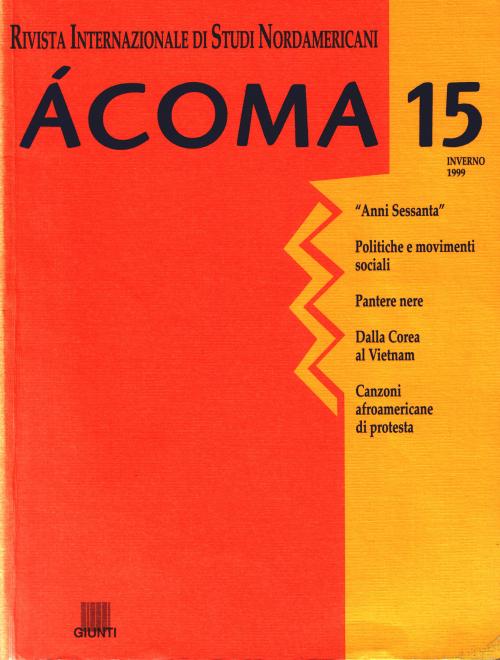You are here
"Anni Sessanta"
Numero 15
Inverno 1999- Anno VI
 Anni Sessanta
Anni Sessanta
 Politiche e movimenti sociali
Politiche e movimenti sociali
 Pantere nere
Pantere nere
 Dalla Corea al Vietnam
Dalla Corea al Vietnam
 Canzoni afroamericane di protesta
Canzoni afroamericane di protesta
Testo a fronte
Canzoni dei movimenti afroamericani: Keep Your Eyes on the Prize - p. 4
"Anni Sessanta"
Gli "anni Sessanta" di cui si parla: politica e movimenti sociali – p. 7
The so-called Sixties were not all “counterculture” and did not last ten years – this is the starting point of the essay. The author shows that the conventional “Sixties” label implies more than just what happened in that decade. The antisegregation movement in the South – which ignited all the others – was a mass movement by the mid-Fifties, and the extraordinary (but often forgotten) wave of working class protest which started in the late Sixties lasted well into the Seventies. Feminism, too, expanded its activities in the Seventies. These social protest movements interfered heavily with the war effort and with the economic policies of the Johnson- Nixon administrations. Many find it easier to isolate the students revolts, the hippies, even the anti-war movement as “counterculture”, meaning something superficial and generational, more or less limited to life-styles and youth “idealism”. That is only a bit of the truth. In the essay it is argued that almost every social and political force was involved in one of the most dramatic and decisive phases of social upheaval of the century.
Fare storia di movimento con "Radical America" – pag. 21
The article is a reflection of a member of the “Radical America” editorial collective in the seventies about the efforts of New Left students who moved on in their lives to continue the exploration of American social history by posing the questions raised in the radical protest movements of the decade. Despite the difficulty of creating a new workerbased movement out of the anti-war, anti-racist and pro feminist impulses of the Sixties, many attempts were made to make the insights of theorists like C.L.R James and historians like E.P. Thompson relevant to actually existing social movements. As a result, “RA” writers contributed to a new multi-cultural, multi-vocal understanding of workers’ movement in US history - a contribution which has worked its way into current understandings of the past and how it bears on the labor movement.
Diventare storico negli anni Sessanta. Riflessioni personali – pag. 35
In this autobiographical essay, Cornell historian Nick Salvatore discusses the intersections between his experience as a young political activist and his career as a professional historian. Salvatore argues that also his pre-Sixties background —and especially his adolescence in Brooklyn as well as his Catholicism— was important in shaping the beliefs and interests that would later mark both his work as a historian and his political militancy. The most enduring lesson he draws from the Sixties is the realization that the historian must always look beneath the political rhoetric and the public posturing to discover the rich and diverse lives of real people.
La lunga marcia fino a Il grande Lebowski: il ri-emergere della guerra di Corea – p. 45
The essay explores the meaning and the mechanisms through which the Korean war was erased from American consciousness so that it became assimilated to the ‘good war’ which had preceded it rather than the ‘bad war’ in Vietnam which was to follow. Marilyn Young accomplish this by means of an articulated analysis of William Styron’s The Long March and other publications about the Korean War, and with references to movies such as The Great Lebowski and Saving Private Ryan.
Black Panther Party: dalla rimozione alla storia – p. 59
The Black Panther Party’s experience is again debated in the United States, particularly within the African American community. The Black Panthers, for years at the center of national attention, were defeated thanks to a brutal repression – conducted by the state through legal and illegal means – and to internal conflicts. Many came to consider the BPP simply as a criminal organization, in consequence of the slandering favored and spread by the FBI and of the violent infighting which characterized the last years of the party. The reality was different. Today it has become possible to reconsider the historical and political experience of the BPP, following the publication of a considerable body of formerly secret documents of the FBI and of memoirs by ex members of the BPP.
La memoria possessiva e la generazione degli anni Sessanta – p. 70
This article explores one of the major impediments to communication of the ‘60s experience, especially during encounters between Baby Boomers (born 1946-1964) and the younger generation born in the Seventies. The collective movements of the Sixties were the locus of transformative “peak experiences” for their participants. The “rebirth”, or new self, engendered by these experiences is both exalted and ineffable, and tends to provoke the phenomenon dubbed by Braunstein “possessive memory”. This unwillingness to confide one’s memory to non-participants stems from a belief that anyone not privy to the Sixties experience cannot possibly understand its value or meaning. The younger generation, however, often regards possessive memory as a form of generational arrogance. Possessive memory, through its silence, often condones the indictments of the ‘60s generation drawn by a younger audience –namely, that ‘60s veterans sold out their values to the marketplace but still retain an inflated sense of their own importance.
Testo a fronte
Birmingham Sunday – p. 76
Why Was the Darkie Born – p. 78
Aggiornamenti
Il passato prossimo come storia: la nuova storiografia americana sugli anni Sessanta – p. 80
Testo a fronte
Oginga Odinga – p. 90
Farewell, Mr. Charlie – p. 92

